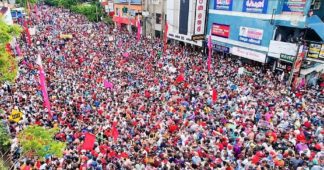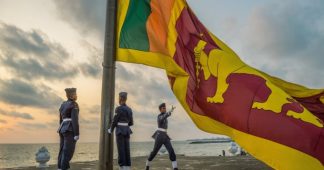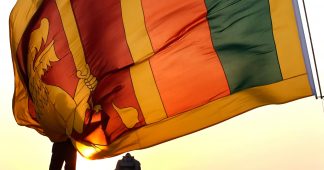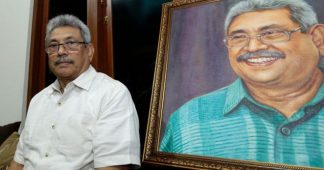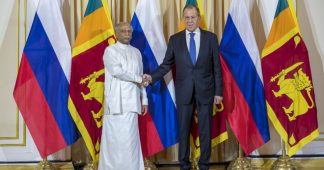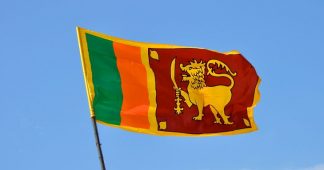By Lasanda Kurukulasuriya
Political developments in Sri Lanka have created an increasingly confusing picture in recent weeks. The surprise appointment of Ranil Wickremesinghe as prime minister by president Gotabaya Rajapaksa raises many questions. In his address to the nation shortly after the violence of 9th May that led to the resignation of former PM Mahinda Rajapaksa, the president pledged to “appoint a prime minister who can secure the confidence of the people and a Cabinet of Ministers.” Wickremasinghe is the lone parliamentary representative of the UNP (United National Party) that was decimated in the election of 2020, with not a single member elected. Wickremesinghe owes his seat to the sole National List slot assigned to the party. How does this appointment ‘secure the confidence of the people?’ The question becomes more pertinent as the proposed 21st amendment to the constitution (21A) is set to further empower the PM.
Against a backdrop of protests demanding ‘system change,’ what we have, at the moment, is a government with an unelected prime minister, a president whose resignation is being called for around the country, and a parliament with the same MPs, many of whom fear to face their electorates. Such is the anger of those languishing in queues day and night to get some fuel, cooking gas and other essentials that the government is unable to deliver, having bankrupted the economy through mismanagement and corruption.
Analysing the main slogans of the protests taking place over the past several months, Jayadeva Uyangoda, Professor Emeritus of the University of Colombo, identified some key aspects of the ongoing crisis. Referring to the ‘go home’ demand directed to the president and all 225 members of parliament, including opposition MPs, he pointed to “the absence of any redress available to the people as voters/electors when the mandate given to the elected is violated or dishonoured by the latter.” In order to remedy this situation he suggests that “in future constitutional and electoral reforms in Sri Lanka, voters should be given the right to recall their elected officials, particularly the President, MPs and representatives of other representative assemblies as a measure to reinforce the concepts of people’s sovereignty and ruler’s accountability to the ruled.” (Decoding political messages from the citizens – Daily Mirror 09.05.22)
President’s powers
We are told the 21A will reintroduce provisions of the 19th amendment. Presumably it will restore the Audit Service Commission and Procurement Commission – vital independent commissions were removed through the 20th Amendment (20A) in 2020. (Not even the justice minister at the time knew who the architect of this piece of legislation was.) There is no clarity as to whether the 21A will remove other features of the 20A that vested an unnecessary degree of power in the presidency. Opposition politicians talk less about ‘abolishing the 20th amendment’ now, than they did earlier.
The Bar Association of Sri Lanka (BASL) in its critique of the draft 21A has called for the inclusion of the 19A provision that bars the president from assigning subjects or functions to himself. But there are hints that the president intends to take over the defence portfolio, that remains conspicuously vacant after the appointment of a 20-member cabinet. This would suggest that he has no intention of stepping down – with the tacit agreement of the PM. In an interview with the BBC soon after his appointment Wickremesinghe had said he “agreed with the sentiment of protestors who’ve been calling for President Rajapaksa to resign but said that would not happen.”
In a later interview he told Sky News: “Should the president resign? That’s a controversy – that’s what the young protesters at Galle Face want. But the BASL says the executive presidency should be abolished, they do not say anything about the president resigning.”
Retaining the executive presidency in some form, as some groups urge, does not necessarily mean that Gotabaya must remain. The opposition Samagi Jana Balavegaya (SJB) in its latest proposals has reportedly argued for an executive presidency with curtailed powers, and for parliament to be allowed to elect a president.
Parliament in disarray
The call to form an ‘interim government’ as a transitional mechanism, till a fresh election is held, has become fainter of late. There is no mention of a time frame for this process to take place. The acceptance of ministerial portfolios by two opposition MPs and a couple of MPs from the government-allied ‘independent’ group, has not created a ‘unity government’ either. If anything this has exacerbated divisions. With the Rajapaksa brothers divided as well, it appears the urgent work of bringing about political stability has been pushed to the back-burner by internal power struggles. The 21A will unseat the president’s brother Basil Rajapaksa with a clause that bars dual citizens from entering parliament. But Basil has backing among MPs of the ruling SLPP (Sri Lanka Podu Jana Peramuna), who are reportedly intent on blocking the passage of the amendment.
Meanwhile the protest calling for the president to ‘Go home’ continues at Galle Face Green (now renamed ‘Gota-Go-Gama,’ meaning ‘Gota-Go-Village’) though with diminished numbers, following the assault on protesters by government backed thugs on 9th May. A statement issued to mark its 50th day said “..we find it utterly deplorable that Premier Wickremesinghe has facilitated the return of former ministers of an indisputably failed government as new ministers in his cabinet.” It called on government to stop arresting and intimidating ‘those exercising their democratic right to protest.’
The challenges faced by the Aragalaya (protest) would seem inevitable, given its fluid, un-structured nature. It could be said that the absence of formal leadership or organisation is both its strength and its weakness. From the outset, the young protesters’ slogan that they ‘had no party, had no colour’ – meaning, they had no affiliation with political parties – attracted thousands from all walks of life, who empathised with their disgust with the entire political class and a degenerate political culture. This overwhelming public support was its strength. At the same time, the absence of leadership or programme, and the porous nature of the protest site – which is a public space accessible to all – has exposed it to twin dangers. One is that of infiltration by disruptors, and the other, the risk of being hijacked by those with other agendas. Both processes seem to be happening. After a recent demonstration held outside the Prime Minister’s office, Gota-go-gama protesters made it known that it was ‘not them.’ Another Aragalaya member published a newspaper article revealing how “some people posing as protesters show up at media briefings and later disappear from the scene,” and that “there are some elements that have come forward to claim the ownership of the aragalaya.”
Many unknowns
There are many unknowns in the current political crisis that are of concern, and some of them raise the question of possible external involvement in the current chaos. Who was behind the extensive burning and looting of politicians’ houses, following the 9th May assault on protesters? Minister Dinesh Gunewardena’s revelation in parliament that drone footage had helped outsiders from the area to accurately locate the targeted houses, introduces a dimension that has hitherto not been associated with political upheavals in this country. Referring to Gunewardena’s revelation, former MP M. M. Zuhair called for a ‘serious investigation’ into possible violations of privacy and threats to national security. “It is unbelievable that amidst such critical situations when, hit by dollar shortages, Sri Lankans are struggling for their daily essentials, an Israeli based company is being promoted here to market fully automated drones, requiring no operator and capable of unlimited data capture and analysis” he said, in a newspaper comment.
It is notable that the US ambassador in Colombo Julie Chung, within minutes of the new prime minister’s appointment enthusiastically tweeted to say she looked forward to working with him. The ambassador’s meeting with JVP (Janatha Vimukthi Peramuna) leader Anura Dissanayake too has raised some eyebrows. In parliament, several MPs accused the party of being behind the attacks on their houses (a charge they deny).
Wickremesinghe whose pro-US leanings are well known, also received a call from USAID Administrator Samantha Power, the day before he was appointed Minister of Finance. The readout on the event, suggesting the call was initiated by Power, said she “held a call with Prime Minister of Sri Lanka Ranil Wickremesinghe to discuss how USAID is responding to the country’s political and economic crises.” Power is known as a strong advocate of ‘R2P’ having backed US military interventions in conflicts elsewhere in the world framed as ‘humanitarian interventions,’ during her previous tenure in the White House.
We remind our readers that publication of articles on our site does not mean that we agree with what is written. Our policy is to publish anything which we consider of interest, so as to assist our readers in forming their opinions. Sometimes we even publish articles with which we totally disagree, since we believe it is important for our readers to be informed on as wide a spectrum of views as possible.
